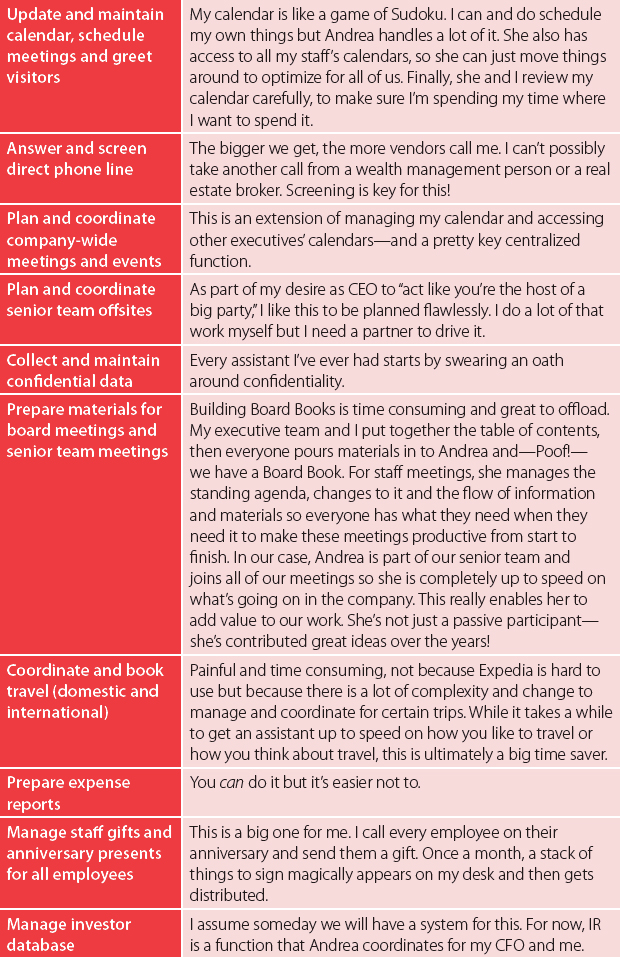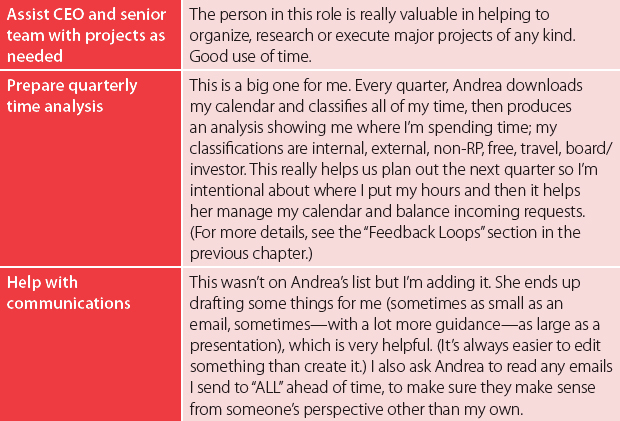CHAPTER FORTY-ONE
WORKING WITH AN EXECUTIVE ASSISTANT
If creating a personal Operating System is the first step to good self-management and time management, the second step is learning how to find and work with an executive assistant.
Other CEOs regularly ask me what value an executive assistant provides, particularly in an era where almost everything can be done in self-service, lightweight ways. It's tempting for CEOs of startups and even companies that are just out of the startup phase, to want to do it all themselves, either because they feel like that they don't need help on small tasks or that it's important to send the message that nothing is beneath them.
I'll say it again: time is your scarcest resource and as the leader of an organization, anything you can do to create more of it is worthwhile. A good assistant does just that—literally creates time for you by offloading hundreds of small things from your plate that sure, you could do but now you don't have to. A great executive assistant can create three to four hours per day for you. That's a lot of time that you can put either back into work or into the rest of your life.
FINDING AN EXECUTIVE ASSISTANT
There are generally two different models of finding a great executive assistant. One is to find a super-smart, entry-level person whom you can convince to do the job for 12 to 18 months with the promise that they will be promoted if they do a great job. A second school of thought is to find a career executive assistant, someone who has been there and done that job for other CEOs of larger companies. I've seen both of these models work and I used to use the first model myself. Then about eight years ago, I ended up frustrated that I had a string of very good assistants who kept getting bored and itching to get promoted out of the role and I was constantly starting over with the next one and the next one. At that point, I found another model that works—sort of a hybrid of the two—which is finding a smart person who is past entry level, who hasn't necessarily worked in an office job before (they might have a background in retail or hospitality) and who thinks the job is interesting in and of itself. You have to be prepared to continue to add responsibilities to the person's role and pay more for it every year to make this model work. Not having to train a new assistant every year is incredibly valuable.
No matter what model you follow, of course, you have to have someone who is incredibly well organized (no dropped balls!), great at multitasking, friendly and personable, a solid communicator and, perhaps most important, not gossipy. My long-time assistant, Andrea Ponchione, excels in every respect.
WHAT AN EXECUTIVE ASSISTANT DOES
I'd classify a great assistant as a bit of an alter ego—one definition of which is “second self”—literally an extension of you as CEO. That means the person is not just doing things for you but acting as you. Think about the transitive property here. Everything you do as CEO is (in theory) to propel the whole company forward. So everything your alter ego does is the same. A great assistant isn't just your administrative assistant. A great assistant is an overall enabler of company success and productivity. You do have to invest a lot of time in getting someone up to speed in this role for them to be effective and you have to pay well for performance but a great assistant can literally double your productivity as CEO.
Andrea was kind enough to provide me with a bulleted list of her job description, which I've annotated with my comments on how I take advantage of that part of her role.
EA Extraordinaire Andrea Ponchione on Working with an Executive Assistant
As I'm writing this book, Andrea, who has worked with me for almost eight years now, is on maternity leave and I'm reminded of just how valuable a great and long-term executive assistant really is! Here, my irreplaceable EA discusses how CEOs can get the most from their assistants.
There are two problems to solve for when thinking about an executive assistant (EA). The first is hiring a great one. (A less-than-great EA can actually slow down your productivity.) The second is to empower your assistant to be an extension of yourself. This takes practice but when you get it right, it will make all the difference.
There are several characteristics to look for when hiring an assistant. To start, a great EA must love what they do. Clearly, this should be true of any hire, but it's especially true when hiring an EA due to the rigors of working closely with an executive. Your EA will struggle if the fit is wrong and this struggle will bubble up to you. Generally, the more a person cares about their job and enjoys the work, the higher quality work they will produce. In the case of an EA, this could not be truer.
Just as important, the EA must be comfortable with ambiguity and have a talent for adapting in response to change. A CEO's schedule can and does change from day to day. What is more, each day is typically crammed with meetings, deadlines and the like. Appointments, conferences and travel arise unexpectedly and in ways that seem nearly impossible to negotiate with existing commitments. It is essential that the EA adeptly handle the last-minute hiccup and seamlessly go with the flow to make everything work. If it's not obvious already, any EA who aspires to a rigid schedule is likely to have a tough go of it.
Once you have hired a great EA, do everything you can to extract all the benefits of having them at your side. The first key tactic is for you as a CEO to set aside time for your assistant. Despite the challenges of a busy schedule, setting a consistent and recurring time to make sure you both are on the same page is essential. In doing this, your assistant will learn your working style and expectations. It will also serve as a conduit to build a good rapport between the two of you. You will be working closely with this person, so it's important that you have a good relationship.
That said, you never want to assume that your assistant can read your mind. (Although if she is really good, she might be able to!) Communication is important. Be clear about tasks and deadlines and communicate them thoroughly. You will be your assistant's mentor in many ways. She will learn directly from you and use that education immediately.
Andrea Ponchione, Executive Assistant, Return Path


